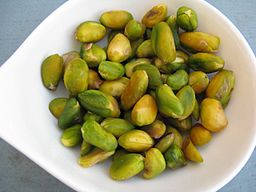This week, read about how stress damages cells and what you can do about it, HONcode certification for my website, the health benefits of nuts for diabetics, and more.
 Stress Damages Cells, but This Trio of Healthy Behaviors Can Protect
Stress Damages Cells, but This Trio of Healthy Behaviors Can Protect
During stressful life events, such as the death of a loved one, caring for a sick family member, or a overly busy schedule, it’s common to struggle to maintain habits that promote good health. But a growing body of research is showing that when stress strikes, it’s even more important to take care of ourselves. Life stresses contribute to poor health, increasing the risk of chronic disease and compromising the body’s immune function.
 Some research suggests that stress influences our health by accelerating cellular aging, as measured by telomere length. Telomeres are recently-discovered structures on the end of chromosomes that help protect from DNA damage (the bright “caps” shown on the image ). As cells age, telomeres shorten and don’t function as well, increasing susceptibility to chronic disease. Studies have linked telomere shortening to many conditions, including diabetes, cancer, Alzheimer’s, and cardiovascular disease.
Some research suggests that stress influences our health by accelerating cellular aging, as measured by telomere length. Telomeres are recently-discovered structures on the end of chromosomes that help protect from DNA damage (the bright “caps” shown on the image ). As cells age, telomeres shorten and don’t function as well, increasing susceptibility to chronic disease. Studies have linked telomere shortening to many conditions, including diabetes, cancer, Alzheimer’s, and cardiovascular disease.
A new study by researchers from UC San Francisco examined how life stressors influence telomere length. They studied a group of post-menopausal women for 1 year, keeping track of the women’s stressful life events and health habits. At the end of the year, researchers found that women who experienced stressful events had shorter telomeres, indicating accelerated cellular aging. But not all women with high stress levels had this cellular damage: those who engaged in healthy behaviors were protected from the cell-damaging effects of stress. These behaviors were (1) maintaining a healthy diet, (2) exercising, and (3) sleeping well. Diet quality was assessed by how often participants ate foods from each of “healthy categories” (whole grains, fruits, vegetables, nuts, seeds,
low fat dairy and fish), and “unhealthy” categories (starches such
as white potatoes and refined grains, red meat, high-fat dairy, fried foods
and sodas).
This is the first study to identify predictors of telomere length change over a short time frame, and builds on earlier research showing that exercise, diet, and sleep can influence telomeres. One of the study’s authors, Elizabeth Blackburn, is a Nobel prize winner in medicine for her co-discovery of telomerase, an enzyme that helps lengthen telomeres. (Mol Psychiatry advance online publication, July 29, 2014).
Remember, during stressful times, make time to take care of yourself with a good diet, proper sleep, and exercise. But since research shows that stressed individuals find it difficult to engage in health promoting behaviors, study authors call on the health care system and policy makers to find “creative and powerful ways to promote engagement and maintenance of health behaviors, which in turn can help allay the destructive effects of the increasing levels of societal stress.”
My Website is HON Certified!
I’m pleased to announce that www.sheilakealey.com just received HONcode certification by the Geneva-based Health on the Net (HON) Foundation. HON is the most widely recognized standard-setting organization for improving the quality of health information on the internet. I’ll provide more details next week.
 This site complies with the HONcode standard for trustworthy health information:
This site complies with the HONcode standard for trustworthy health information:
verify here.
Nuts Healthful for Diabetics
Three new studies reveal the health benefits of nuts for adults with Type 2 diabetes. Two studies were conducted by John Sievenpiper of Toronto’s St. Michael’s Hospital . One study reviewed the results of 12 clinical trials, and found that 2 servings/day (about 1/2 cup) of tree nuts improved glucose control, as measured by the HbA1c test and fasting glucose. Sievenpiper’s second study found that eating tree nuts reduced triglycerides and blood sugars (two out of five markers for metabolic syndrome). (PlosOne July 30, 2014; BMJ Open 2014;4).
TREE NUTS INCLUDE almonds, Brazil nuts, cashews, chestnuts, coconuts, hazelnuts, pecans, macadamia nuts, walnuts, pine nuts and pistachios (but not peanuts).
 In another study, researchers at Penn State found that adults with diabetes who consumed pistachios daily had more favorable physiological responses to stressful events (the physical challenge was immersing a hand into ice water for 2 minutes; the mental challenge was a confusing math test). They showed that 2 servings of pistachios daily lowered vascular constriction and improved the heart’s neural control during these stressful events. Other improvements on the pistachio diet included lower blood pressure and improved heart rate variability (how well the nervous system controls heart function). (J Am Heart Assoc 2014 Jul 01).
In another study, researchers at Penn State found that adults with diabetes who consumed pistachios daily had more favorable physiological responses to stressful events (the physical challenge was immersing a hand into ice water for 2 minutes; the mental challenge was a confusing math test). They showed that 2 servings of pistachios daily lowered vascular constriction and improved the heart’s neural control during these stressful events. Other improvements on the pistachio diet included lower blood pressure and improved heart rate variability (how well the nervous system controls heart function). (J Am Heart Assoc 2014 Jul 01).
How Are You Intelligent?
While this video “How Are You Intelligent” by creativity and education expert Sir Ken Robinson doesn’t exactly fall under the realm of food, health and fitness, it offers some beautiful images and food for thought.
Other Links of Interest This Week:
- What Somebody’s Mummy Can Teach You About Heart Disease. CT scans of Egyptian mummies show signs of hardened, narrow arteries: inhaling smoke from open fire pits and inflammation triggered by dirty living conditions may be to blame. (NPR Health)
- This week in pseudoscience: the food babe takes on fig newtons.
- Marketing Gimmicks: Pepsi Made With “Real” Sugar
- Trouble finding the time to eat well & exercise? Some great advice by Dr. Greg Wells (Globe & Mail)
- Google Glass Alert: Potential health risks from wireless radiation? (UC Berkeley Center for Family and Community Health)
- 8 restaurant meals with the highest calories: 2,780 calories in Cheesecake Factory french toast! (Vox/Center for Science in the Public Interest)
- Wondering if non-celiac gluten sensitivity really exists? A look at the evidence. (Healthy Debate)
- How a restaurant menu’s layout & descriptions affects food choice (Cornell Food & Brand Lab)
- The clever marketing of coconut water (New York Times)
- A chef’s perspective: Gluten Intolerant… Intolerant (Marc Vetri, Huffington Post)
- Modest running mileage extends longevity, protects against heart disease (Amby Burfoot, Runners World)
- Grains, Inflammation and AutoImmunity (Kevin Klatt, Nutrevolve)
- As Technology Makes Bicycles Lighter & Faster, Cyclists Are Falling Harder (Ian Austen, New York Times)
___________________________________
Photo Credits:
- Telomeres: Courtesy of NASA/JPL-Caltech
- Pistachios By Nadiatalent (Own work) [Public domain], via Wikimedia Commons
See More Issues of This Week in Food, Health, and Fitness
Share This: